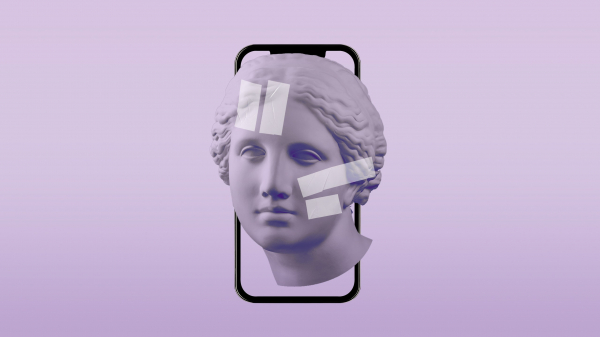 Channing Smith // Allure
Channing Smith // Allure
We'll admit: the Allure staff has learned a fair share of beauty track from TikTok. Thanks to some smart creators, we're changing up the way we use concealer, shop at the drugstore, and apply our highlighter. But sometimes, we see a video go viral and instantly start asking medical professionals for answers because the hack's results seems far too good to be true. The latest example flooding social media? Face taping to smooth fine lines.
The logic behind these face-taping videos, which a handful of TikTok-savvy dermatologists have stitched in response, is that a few days of wearing tape on your face overnight can keep your wrinkles from deepening and forming. Some of these videos' "results" do look convincing — a few of the wrinkles in question do look less prominent — but the internet is obviously skeptical.
Many users are calling creators out for potentially editing the videos, or recording them a week before their Botox (which is actually proven to reduce the appearance and formation of fine lines) kicks in. To settle the efficiency of this viral trend once and for all, we checked in with plastic surgeons to investigate whether or not face taping actually works.
Meet the experts:
- Norman M. Rowe, MD, a board-certified plastic surgeon and founder of Rowe Plastic Surgery in New York and New Jersey.
- Michael Horn, MD, a board-certified plastic surgeon in Chicago, Illinois.
What is face taping?
The method is pretty straightforward: users are applying tape to areas of the face where they wish to reduce the appearance of wrinkles or fine lines (mostly on their foreheads) and wear the tape overnight to prevent movement. When they wake up, users remove the tape and repeat the process for a week or more, recording the progress. The idea, according to Michael Horn, MD, a board-certified plastic surgeon in Chicago, Illinois, is that the tape will keep the muscles in place throughout the night, limiting their motion, and, therefore, minimizing wrinkles.
"During our sleep, it's possible we can still make facial expressions and move around as we adjust, so [the ideas is that] using tape is supposed to 'keep it in place,' preventing wrinkle formation," explains Dr. Horn. So can a week of face taping actually make as big of a difference as your favorite firming serum or injectable?
Is it safe to tape your face?
While a bit of Scotch tape probably won't leave permanent scars, face taping can end up doing more harm than good. "Using a piece of tape, especially one that is 'supposed' to hold your skin down for a whole night, can damage the skin barrier when you take it off," explains Dr. Horn. He notes that this tape isn't made to be safe on the skin and can cause redness, irritation, and acne breakouts. Additionally, he says, the adhesive must be incredibly tight and, therefore, uncomfortable to use for an extended time to "hold" the muscles still.
Also, common sense is a key factor here. If you bought the tape at Home Depot, it's probably going to screw up your skin. "While the main risk of this hack is false hope, if someone used a really strong adhesive tape, they could pull off their top layer of skin when it is removed," adds Norman M. Rowe, MD, a board-certified plastic surgeon and founder of Rowe Plastic Surgery in New York and New Jersey.
Does face taping work?
In short, no. The logic sounds like it makes sense though, right?
"In theory, using tape to keep muscles in place while you sleep by not allowing them to wrinkle as you move throughout the night should work," says Dr. Horn, but warns that it can actually "have the complete opposite effect" and end up making those lines you're intent on erasing even more noticeable.
"When you tape your face to hold muscles still, you're preventing them from doing what they're supposed to, thus adding resistance," he explains. "In doing so, you're training your facial muscles to work harder and, in turn, become more powerful. Over time they can become stronger, accelerating the formation of the fine lines and wrinkles you were hoping to avoid."
Dermatologists and plastic surgeons are trained to know exactly how the facial muscles move and change, which is why they're the right people to consult when you're looking to make changes to your appearance — not your average TikTok user.
There's also a reason that there's been billions of dollars and decades spent developing cosmetic advancements like fillers, neurotoxins, and lasers to address lines and wrinkles. To put it even more simply: it's just not that easy.
"It's too simplistic to think that taping the skin with prevent underlying muscle from causing wrinkles," says Dr. Rowe, noting that no matter how many nights you keep up the habit, you won't see any real progress. "There are numerous factors at play that taping just doesn't address."
What are alternatives to face taping?
The tried and true methods of treating fine lines and wrinkles apply here: skin care, sun protection, and injectables.
"There is always sunblock, adjusting your skin-care routine, and even Botox," says Dr. Horn, who, along with Dr. Rowe, recommends using sunscreen with SPF 30 or higher to protect the skin. If you want to stick with some at-home treatment, he adds that including a retinoid in your daily skin-care routine can improves cellular turnover, which reduces the appearance of fine lines and can treat them before they form.
"Botox helps to prevent fine lines, which is the best and [a safe] alternative to face taping," says Dr. Rowe. "An ounce of prevention is worth a pound of cure — or tape for that matter."